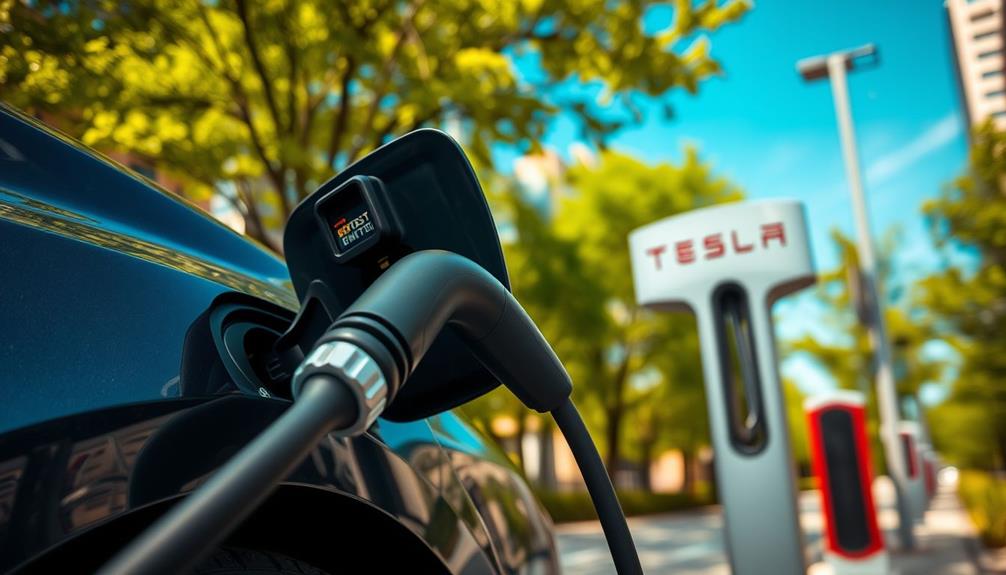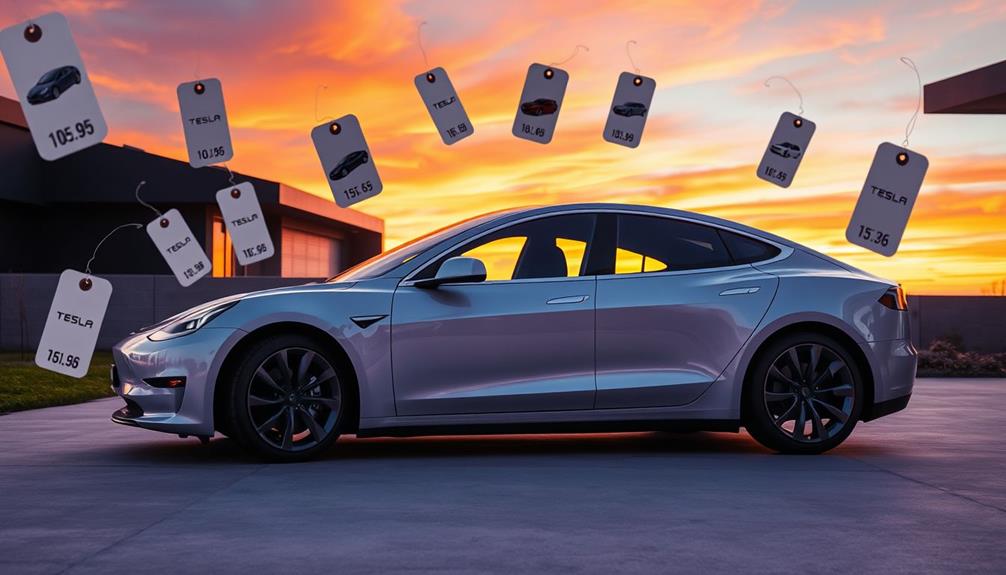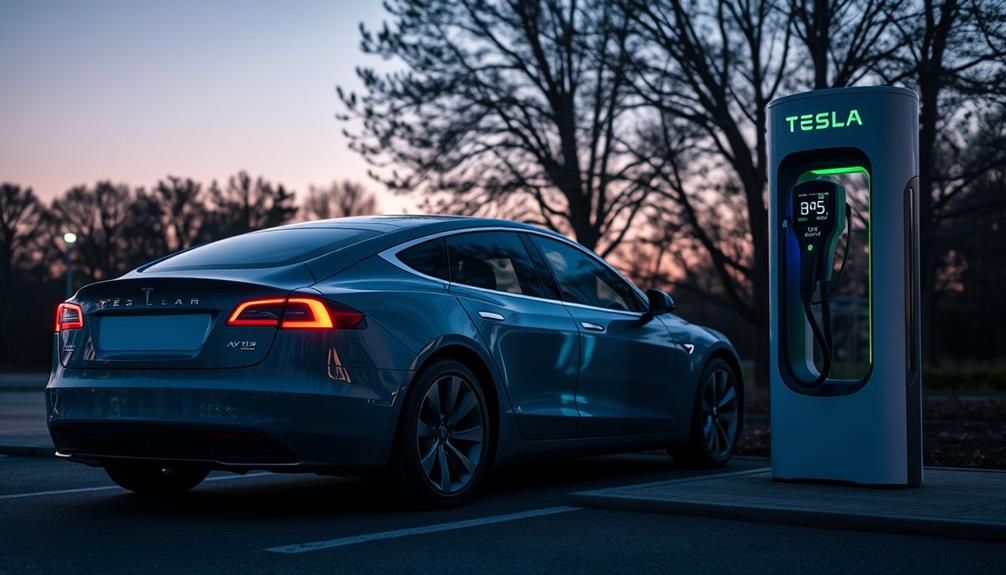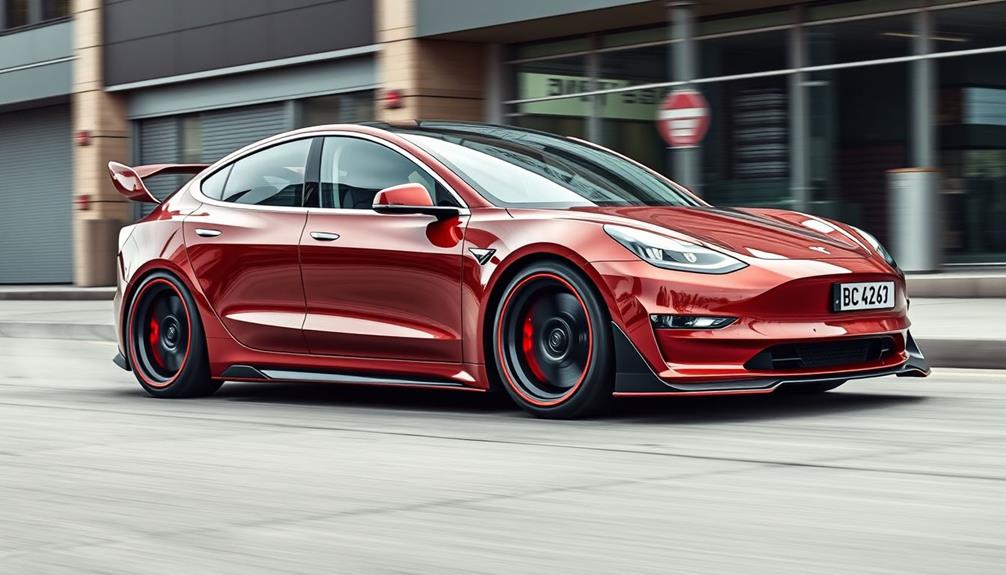Charging a Tesla is often cheaper than you think. On average, it costs around $15.52 for a full charge, with home charging considerably lower, typically between $8.28 and $14.40. When you compare this to the average fueling cost of gas vehicles, which can reach $143 monthly, the savings become clear. Per-mile charges for Teslas are just 4.56 cents, while gas cars cost 13.73 cents. Plus, if you invest in solar energy, charging could drop to as low as $3.11. Curious about how further savings could impact your wallet? You might be surprised at what you can discover.
Key Takeaways
- Charging a Tesla averages $15.52, significantly cheaper than the gas vehicle average fueling cost of $143 monthly.
- Per-mile charging cost for a Tesla is 4.56 cents, compared to 13.73 cents for gas vehicles, resulting in long-term savings.
- Home charging is more economical, costing between $8.28 to $14.40, while Supercharger costs can vary based on location.
- Utilizing solar energy can further reduce charging costs to about $0.06 per kWh, offering substantial savings on electricity.
- Average yearly charging expenses are $614.95, leading to potential lifetime savings of up to $12,000 compared to gasoline vehicles.
Cost of Charging a Tesla
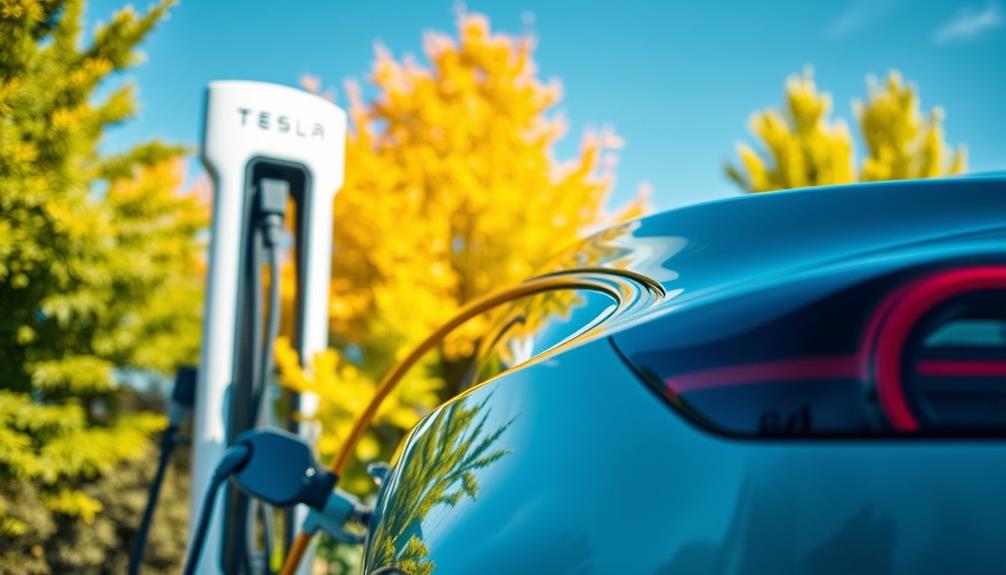
When you're looking to charge a Tesla, you'll likely find that it's more affordable than you might expect. The average cost to charge a Tesla is around $15.52, with specific models varying from $10.95 for the Model 3 to $17.99 for the Model X.
You're charging costs per mile are approximately 4.56 cents, which is a significant saving compared to the 13.73 cents per mile for gas-powered vehicles.
Over a year, the average yearly charging cost for your Tesla is estimated at $614.95. That's a stark contrast to the average yearly fueling cost of $1,850.42 for gas vehicles.
If you're considering home charging, you can expect costs between $8.28 and $14.40, making it a cheaper option than most public charging stations.
If you have solar energy, you can lower your charging costs even further, potentially to as low as $0.06 per kWh. This means the savings from charging your Tesla stack up quickly, allowing you to enjoy the benefits of an electric vehicle without breaking the bank.
Comparing EV and Gas Costs
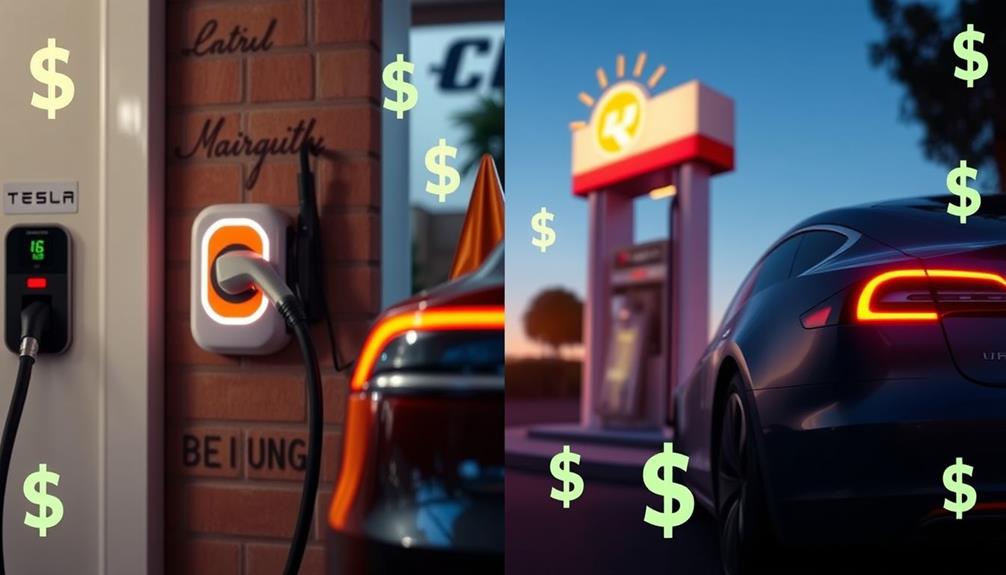
When you compare the costs of charging a Tesla to fueling a gas vehicle, the savings become clear.
You'll notice that charging isn't only cheaper per mile, but it can also lead to significant long-term savings over time.
Additionally, regional price variations can further impact your overall expenses, making it essential to understand the full picture.
Charging Cost Breakdown
Charging costs play an essential role in the overall ownership experience of electric vehicles (EVs) compared to traditional gas-powered cars. When you charge a Tesla, the average cost for a full charge is about $15.52, notably lower than the average yearly fueling cost of $1,850.42 for gas vehicles.
For Tesla Model 3 owners, each full charge costs roughly $10.95, allowing a range of 272 miles, while the Model S costs around $17.83 for a range of 405 miles.
In terms of per-mile expenses, Tesla charges about 4.56 cents compared to 13.73 cents for gas vehicles, making it much cheaper than filling up a tank. If you opt for home charging, you could pay between $36 and $53 monthly, in stark contrast to the approximate $143 for gas cars.
Plus, if you use solar panels, your charging costs could drop even further to around $0.06 per kWh, leading to monthly expenses as low as $24. For EV owners, these figures showcase just how economical charging a Tesla can be.
Long-Term Savings Overview
Long-term savings with a Tesla can be quite significant compared to gas-powered vehicles. When you look at charging costs, you'll see that a full charge averages about $15.52, while the typical yearly fueling cost for gas vehicles is around $1,850.42. This difference translates to substantial long-term savings for you as an EV driver.
The average cost per mile for driving a Tesla is roughly 4.56 cents, compared to 13.73 cents for gas vehicles. This means you could save about $1,235 annually. Over a lifespan of 300,000 miles, you might save up to $12,000 compared to traditional gasoline vehicles, based on current fuel costs and efficiency.
When it comes to monthly charging costs, Tesla models range from $36 to $53, which is much lower than the $143 average for gas vehicles. If you harness solar energy for charging, your costs could drop to around $24 a month, making electric vehicle ownership even more economical over time.
Regional Cost Variations
Regional cost variations can greatly impact your experience as a Tesla owner, especially when comparing charging costs to those of gas vehicles. Depending on where you live, the cost to charge your Tesla can fluctuate considerably. In regions with lower electricity rates, like the West South Central U.S., you might spend as little as 3.65 cents per mile. In contrast, gas vehicles average 13.73 cents per mile, leading to substantial savings.
Here's a quick comparison:
| Region | Average Cost to Charge (cents/mile) | Average Monthly Charging Cost |
|---|---|---|
| West South Central | 3.65 | $36 – $53 |
| New England | 6.77 | $53 – $75 |
| California | 8.50 | $60 – $80 |
| Hawaii | 9.00 | $65 – $85 |
| National Average | 5.50 | $45 – $65 |
As you can see, charging costs can vary. In fact, the average monthly charging cost for a Tesla is between $36 and $53, while gas vehicles can cost you around $143. These regional cost variations highlight the affordability and savings that come with Tesla ownership.
Factors Influencing Charging Expenses
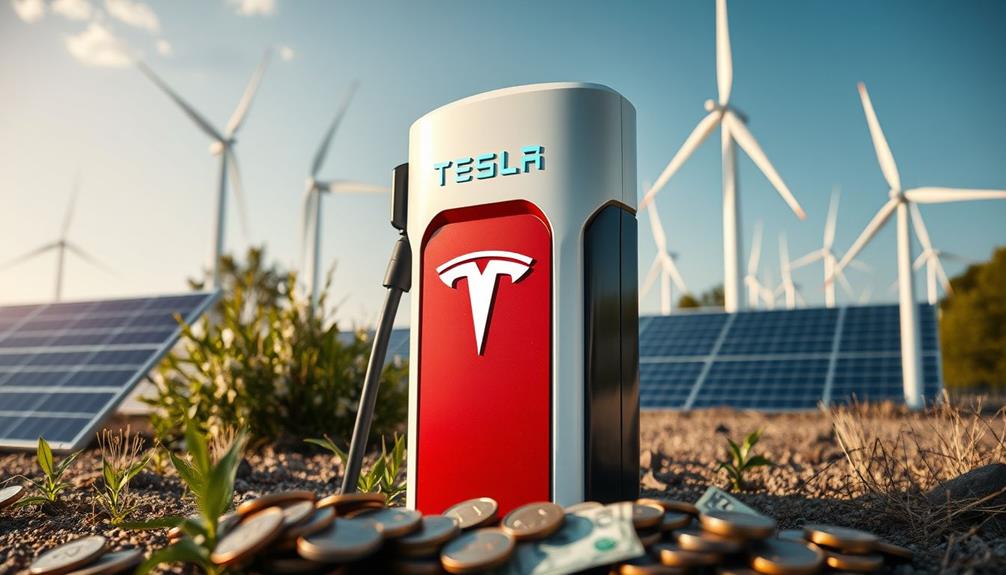
Numerous factors can considerably impact the expenses associated with charging your Tesla. Understanding these elements will help you manage your charging costs effectively.
- Charging Efficiency: Level 2 chargers typically operate at 85%, while Level 3 chargers exceed 90%, affecting total energy needs.
- Tesla Model: The Model 3 has a lower cost per mile (4.03 cents) compared to the Model X (5.17 cents), influencing your charging frequency.
- Home vs. Public Charging: Charging at home generally costs between $8.28 to $14.40 for a full charge, while public charging stations can range from $6 to over $50.
- Seasonal Climate Conditions: Colder weather can negatively impact battery performance, leading to increased charging needs.
Additionally, the average U.S. electricity rates hover around $0.16 per kWh, but in states like California and Hawaii, you might face rates as high as $0.43 per kWh.
These factors combined can considerably sway your charging expenses, whether you're charging at home or using public charging stations. By considering these aspects, you can make informed decisions about your Tesla charging habits.
Solar Energy Impact on Costs
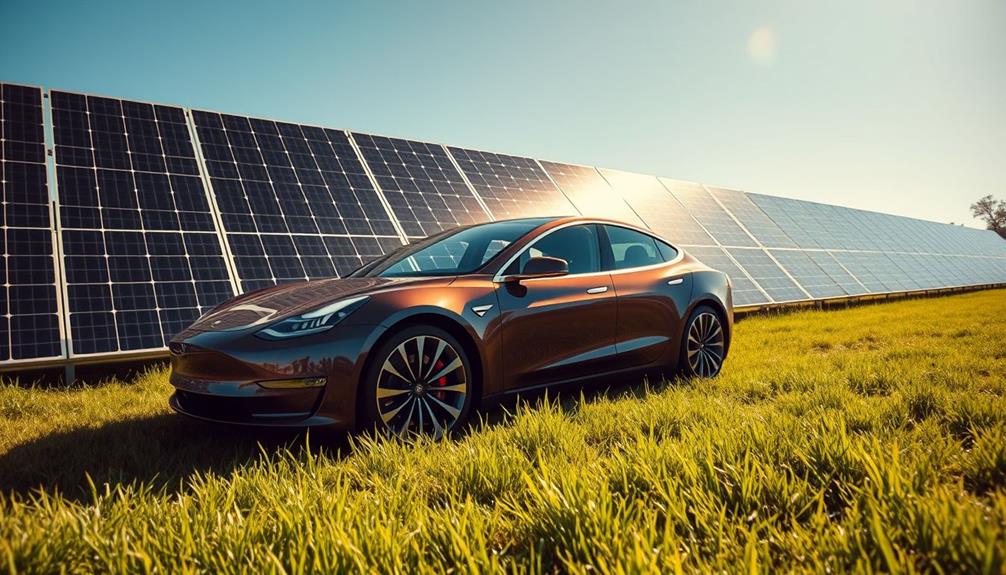
Charging your Tesla with solar energy can dramatically cut down your costs. Instead of paying the average charging cost of around $0.16 per kWh for traditional electricity, you could reduce it to just about $0.06 per kWh with solar energy. This means your total charging costs for your Tesla could range from only $3.11 to $5.40, depending on your model and the efficiency of your solar installation.
While the initial investment for a typical solar system is around $19,000, the long-term benefits are significant. With a return on investment of 7-8 years, you'll enjoy virtually free charging after that period.
By installing just five solar panels, you can cover your Tesla's charging needs entirely with renewable energy. This shift not only lowers your operational costs but also contributes to a more sustainable future.
The savings you'll gain from using solar energy to charge your Tesla can make a substantial difference in your budget over time. So, if you're considering ways to reduce your expenses, investing in solar energy for your Tesla is a smart choice that pays off in the long run.
Tesla Longevity and Charging Options
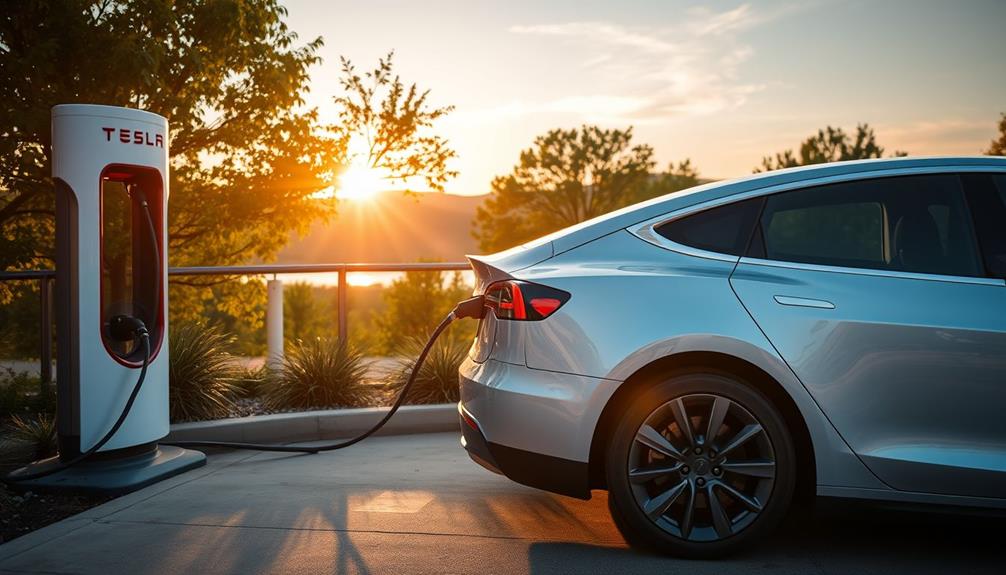
When you choose a Tesla, you're investing in a vehicle designed to last up to a million miles, making it a long-term option for your driving needs.
With various charging options like Level 1, Level 2, and Superchargers, you can find a solution that fits your lifestyle.
Understanding these charging methods can help you maximize your Tesla's longevity and performance.
Charging Options Overview
For Tesla owners, understanding the various charging options is essential for maximizing the vehicle's longevity and performance.
You have three primary charging options to evaluate:
- Level 1 Chargers: These take about 20 to 40 hours to fully charge your Tesla, making them suitable for overnight use.
- Level 2 Chargers: More efficient than Level 1, these chargers require 8 to 12 hours to fully charge your vehicle, operating at around 85% efficiency.
- Level 3 Supercharger: The fastest option, these can add 200 miles of range in just 15 minutes, boasting over 90% charging efficiency.
- Home Charging: The average cost to fully charge at home in 2024 ranges from $8.28 to $14.40, considerably lower than gasoline vehicles.
Vehicle Lifespan Expectations
Understanding the lifespan expectations of your Tesla is essential for planning its long-term maintenance and usage. Tesla vehicles, especially the Model 3, can last up to a million miles with a battery life ranging between 300,000 and 500,000 miles. Given the average U.S. annual driving distance of 13,476 miles, you can expect your Tesla to serve you for about 22 to 37 years, depending on your usage.
As you consider charging options, keep in mind that most Tesla owners primarily charge at home. This method is typically cheaper than public charging, leading to significant savings over the vehicle's lifespan. Tesla models can undergo around 1,500 full charge cycles before they require significant battery maintenance.
When charging your Tesla, you'll find various options available—Level 1 chargers take 20 to 40 hours for a full charge, Level 2 chargers need 8 to 12 hours, and Level 3 Superchargers can provide 200 miles of range in just 15 minutes.
Home Vs. Supercharger Costs

Charging your Tesla at home can be a game-changer for your wallet compared to using a Supercharger. The costs associated with home charging are markedly lower, making it an attractive option for Tesla owners.
Here's a quick comparison of the costs you'll encounter:
- Home charging for a full charge typically ranges from $8.28 to $14.40.
- Supercharger costs vary greatly, averaging between $6.01 and $57.00 depending on the model and location.
- Monthly charging costs at home can range from $36 to $53, which is cheaper than gas and considerably lower than the average monthly fueling cost of $143 for gas-powered vehicles.
- Charging a Tesla Model 3 at a Supercharger could hit your wallet for $6 to over $50.
With home charging, you save on both the average cost per charge and the overall monthly charging costs.
In contrast, using a Supercharger can lead to unexpected fees, like idle and congestion fees. By choosing home charging, you can enjoy the convenience of fueling your Tesla overnight while keeping your expenses in check.
Driving Habits and Charging Needs

Adapting your driving habits can considerably influence your Tesla's charging needs. If you mainly drive short distances, your overall annual charging cost will likely be lower than if you frequently undertake long trips.
The average U.S. driver covers about 13,476 miles a year, resulting in an estimated yearly charging cost of $614.95 for a Tesla. However, by leveraging Tesla features like regenerative braking, you can enhance energy efficiency, further reducing your charging expenses.
Planning your charging sessions during off-peak hours is another smart strategy. Electricity rates fluctuate throughout the day, and charging during these lower-cost periods can lead to significant savings.
Understanding your personal driving patterns will allow you to better strategize your charging habits, ensuring you maximize savings while minimizing downtime.
Ultimately, by being mindful of your driving habits and how they impact your charging needs, you can make informed decisions that lead to a more cost-effective Tesla ownership experience.
With the right approach, you'll enjoy the benefits of electric driving without the burden of excessive charging expenses.
Analyzing Long-Term Savings
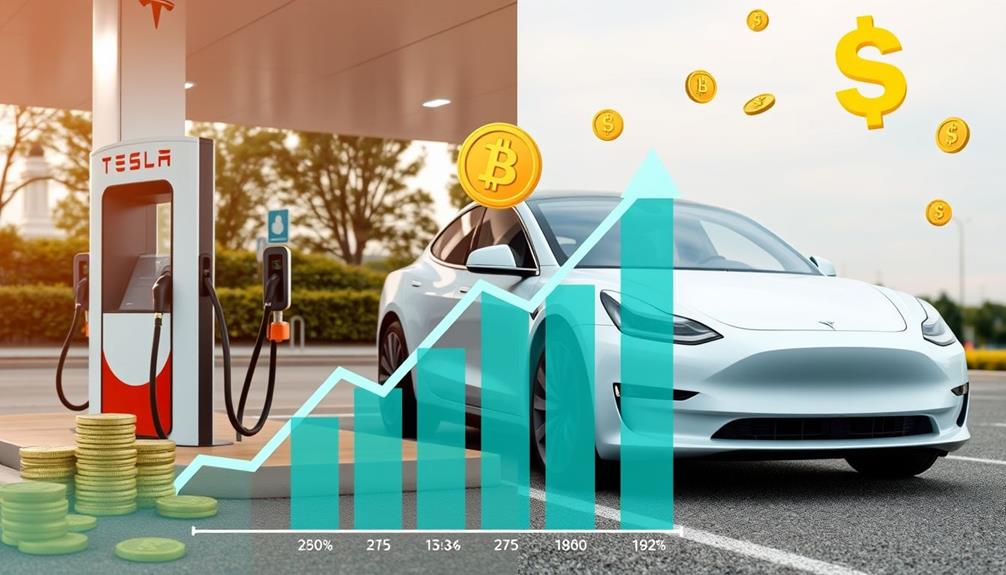
Electric vehicle ownership can lead to significant long-term savings, especially when you consider the stark contrast in fueling costs between Teslas and traditional gas vehicles.
By charging an electric vehicle, you'll notice that the average costs are much lower, leading to impressive annual savings.
- Annual Charging Costs: Around $614.95 for a Tesla versus $1,850.42 for gas vehicles.
- Cost Per Mile: Charging a Tesla averages 4.56 cents per mile, while gas vehicles average 13.73 cents.
- Lifetime Savings: Over 300,000 miles, you could save up to $12,000 compared to traditional gas vehicles.
- Solar Energy Benefits: Charging at home with solar energy could reduce your charging costs to as low as $0.06 per kWh.
These factors combined illustrate why EV owners experience considerable gas savings.
When you drive a Tesla, not only are you saving money at the pump, but you're also benefiting from lower charging costs.
This makes Tesla ownership a smart choice for those looking to maximize their budget over time.
Resources for Tesla Owners

Owning a Tesla not only offers impressive savings on fueling costs but also opens the door to a variety of resources designed to enhance your experience.
As a Tesla owner, you can explore the EnergySage Marketplace, where you can compare solar installation quotes tailored specifically for your EV charging needs. This could mean substantial long-term savings on your charging costs.
With the average yearly charging cost for Tesla vehicles around $614.95, it's evident that EV ownership offers a financial edge over gas-powered vehicles, which typically rack up about $1,850.42 a year.
If you drive a Model 3, your charging cost is approximately 4.03 cents per mile, while Model S owners face about 4.40 cents per mile.
Additionally, many Tesla owners enjoy free charging at various locations, like supermarkets and shopping centers, which helps cut down on those charging expenses even more.
To further understand your charging economics, Tesla's official site provides FAQs that break down charging costs, compare them to gas vehicles, and explain available electric vehicle incentives.
These resources make your shift to Tesla smoother and more informed.
Frequently Asked Questions
Is Charging a Tesla Cheaper Than Buying Gas?
Charging a Tesla is definitely cheaper than buying gas. You'll spend considerably less per mile, saving hundreds annually. Even in states with higher electricity rates, it remains a more economical choice for your driving needs. Additionally, the long-term savings of owning a Tesla extend beyond just the cost of charging versus buying gas. With little to no maintenance required and lower overall operating costs, the savings can add up significantly over time. Plus, considering the potential cost of Tesla battery replacement costs down the line, the overall savings from reduced fuel and maintenance expenses make owning a Tesla an attractive option for many drivers.
Is Charging a Tesla Cheaper Than Buying Gas?
Imagine cruising down the highway, your wallet feeling lighter. Charging a Tesla's often cheaper than buying gas. You'll save about $1,235 a year, making each mile feel like a victory for your budget.
How Much Cheaper Is Charging a Tesla?
Charging a Tesla is markedly cheaper than fueling a gas vehicle. You'll spend around $15.52 per full charge, compared to $1,850.42 annually for gas, resulting in substantial savings over time.
Is It Cheaper to Charge a Tesla at Home or Supercharger?
Charging a Tesla at home's usually cheaper than using a Supercharger. You'll save considerably on costs, with home charging averaging $36 to $53 monthly, while Superchargers can vary widely, driving up your expenses.
Conclusion
To sum up, charging a Tesla can often be cheaper than you think. For instance, on average, it costs about $0.13 per kWh to charge at home, compared to roughly $3.50 per gallon for gasoline. This means that, depending on your driving habits, you could save hundreds annually. With the potential for solar power integration and long-term savings, owning a Tesla not only benefits your wallet but also supports a greener future. So, it's worth considering!
